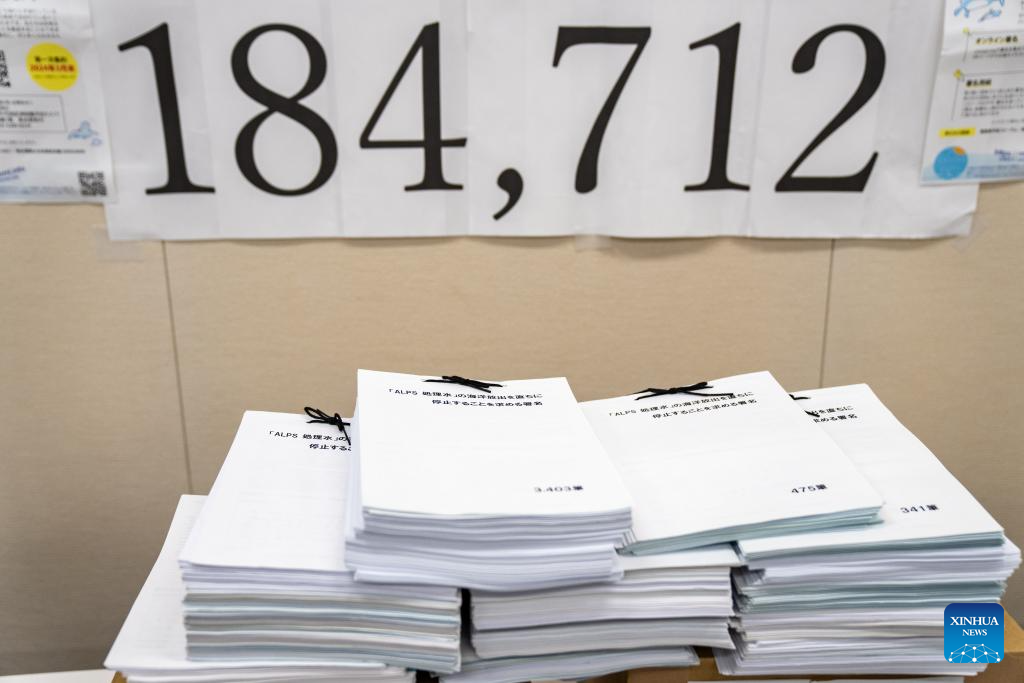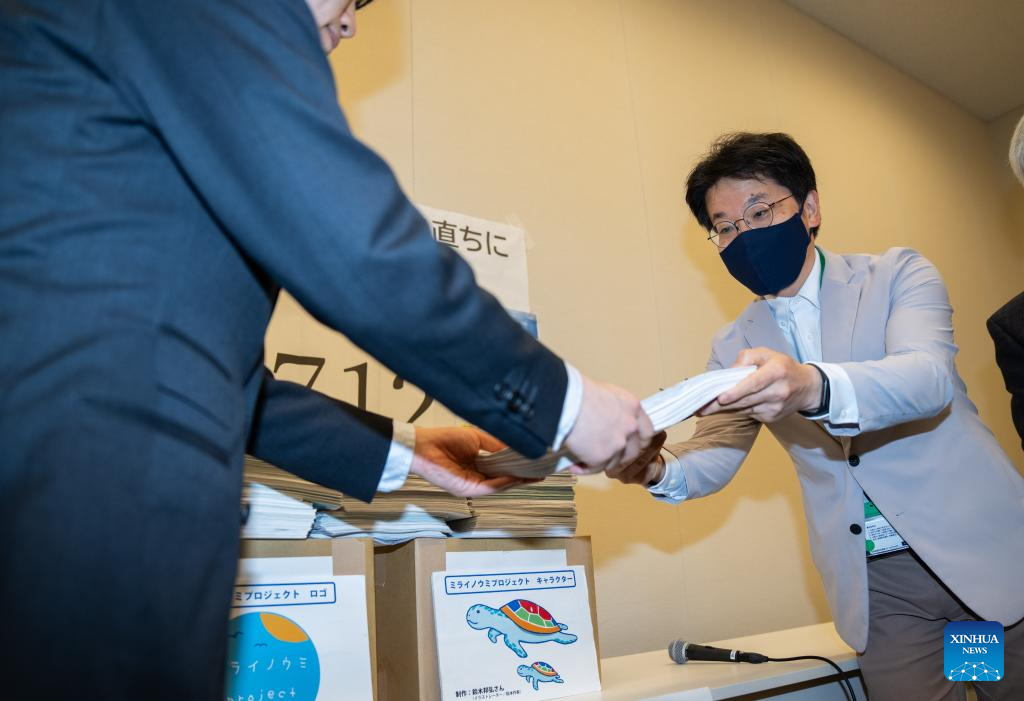
TOKYO, April 24 (Xinhua) -- Representatives from Japanese civic groups on Wednesday submitted over 180,000 signatures from local citizens to the Japanese government, urging both the government and Tokyo Electric Power Company (TEPCO) to immediately halt the ocean discharge of nuclear-contaminated water from the crippled Fukushima Daiichi Nuclear Power Plant.
Hajime Matsukubo, secretary general of the Citizens' Nuclear Information Center, a Japanese non-profit organization, presented 184,712 citizen signatures to the representative from the Ministry of Economy, Trade, and Industry at the Second Members' Office Building of the House of Representatives in Tokyo.
The petitioning campaign, initiated earlier this year by civic groups including the Fukushima Prefecture Peace Forum under a project called Future's Ocean, or Mirainoumi in Japanese, has gained momentum.
"The nuclear-contaminated wastewater contains radioactive substances that cannot be removed, and the environmental impact of continued discharge into the ocean will persist for decades," Masashi Tani, secretary general of the Japan Congress against A- and H-Bombs, told a press conference on Wednesday.
Stressing that the right course of action is to halt the ocean discharge immediately, Tani underscored the universal relevance of the issue. "Although the nuclear accident took place in Fukushima, the ocean discharge of nuclear-contaminated water goes beyond the region, as it affects everyone connected to the sea," he said.
Tani emphasized the importance of thorough discussions about the issue to ensure a secure living environment for future generations.
"No other nuclear power plant that has experienced accidents has discharged water into the ocean to date. The long-term risks associated with such actions remain unknown," Tani told Xinhua in an interview.
Reiterating the necessity to prioritize land-based storage over ocean discharge, Tani affirmed that Wednesday's signature submission marks the beginning of the ongoing campaign until an end to the discharge of the nuclear-contaminated water.
During the press conference, Japanese House of Representatives member Makoto Yamazaki expressed concerns over the operation of TEPCO's Advanced Liquid Processing System (ALPS), citing accidents such as staff being splashed with waste liquid during the cleaning of ALPS pipelines and leaks from exhaust outlets containing radioactive substances.
Yamazaki criticized TEPCO's management system and implementation methods and called for a halt to the discharge and a thorough investigation.
"Is it really okay for the ocean discharge to continue like this? Isn't its impact on the environment and the lives of people who make a living from fisheries a huge problem? I think we should stop and carefully reinvestigate these issues."
Despite furious opposition both at home and abroad, the ocean discharge of the Fukushima nuclear-contaminated water began in August 2023, and a total of about 31,200 tons of the water was released in four rounds in fiscal year 2023 through March.
The release of the fifth batch of water began last Friday and is expected to continue until May 7, with approximately 7,800 tons of the nuclear-contaminated water set to be discharged.
On Wednesday, the discharge was suspended at the plant due to a power outage at around 10:43 a.m. local time.
According to local media reports, the outage may have been caused by excavation work damaging power lines within the plant. On the same day, an employee of a collaborating company involved in the excavation work sustained burns and was urgently transported to a hospital.
Amid raging credibility and safety concerns among the Japanese public following a series of accidents at the crippled plant, TEPCO and the Japanese government have been frequently challenged for the ocean discharge as the decommissioning process remains ambiguous.

Hajime Matsukubo (R), secretary general of the Citizens' Nuclear Information Center, a Japanese non-profit organization, presents citizen signature documents at the Second Members' Office Building of the House of Representatives in Tokyo, Japan, April 24, 2024. Representatives from Japanese civic groups on Wednesday submitted over 180,000 signatures from local citizens to the Japanese government, urging both the government and Tokyo Electric Power Company (TEPCO) to immediately halt the ocean discharge of nuclear-contaminated water from the crippled Fukushima Daiichi Nuclear Power Plant. (Xinhua/Zhang Xiaoyu)